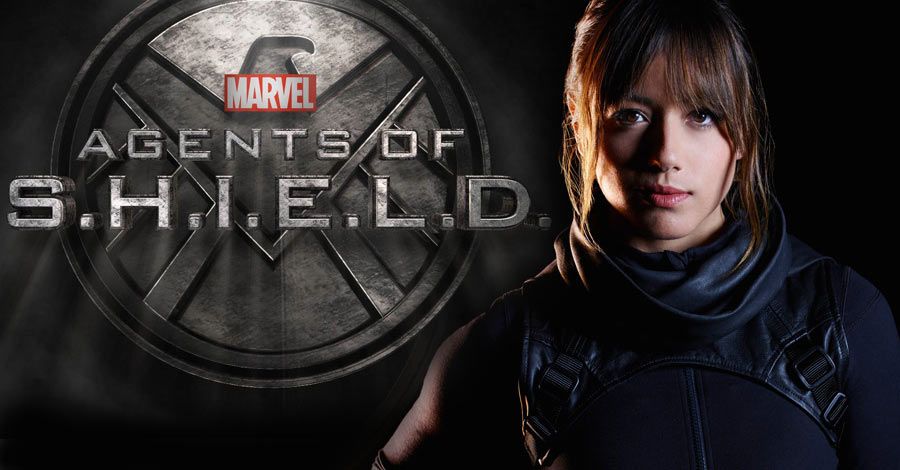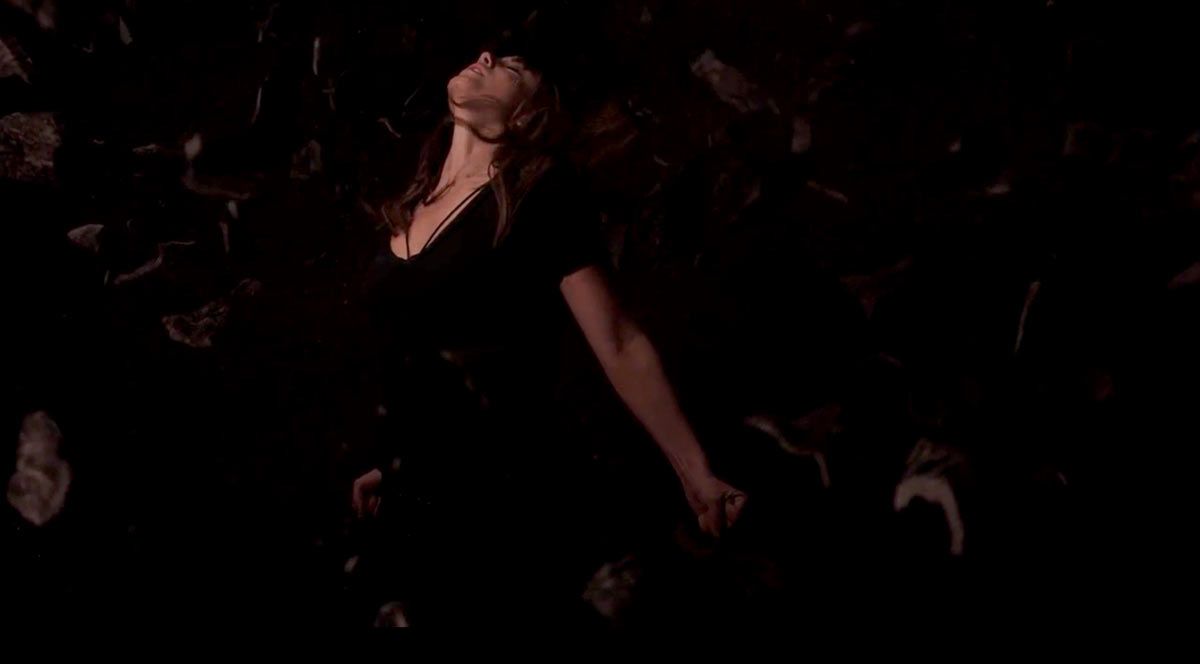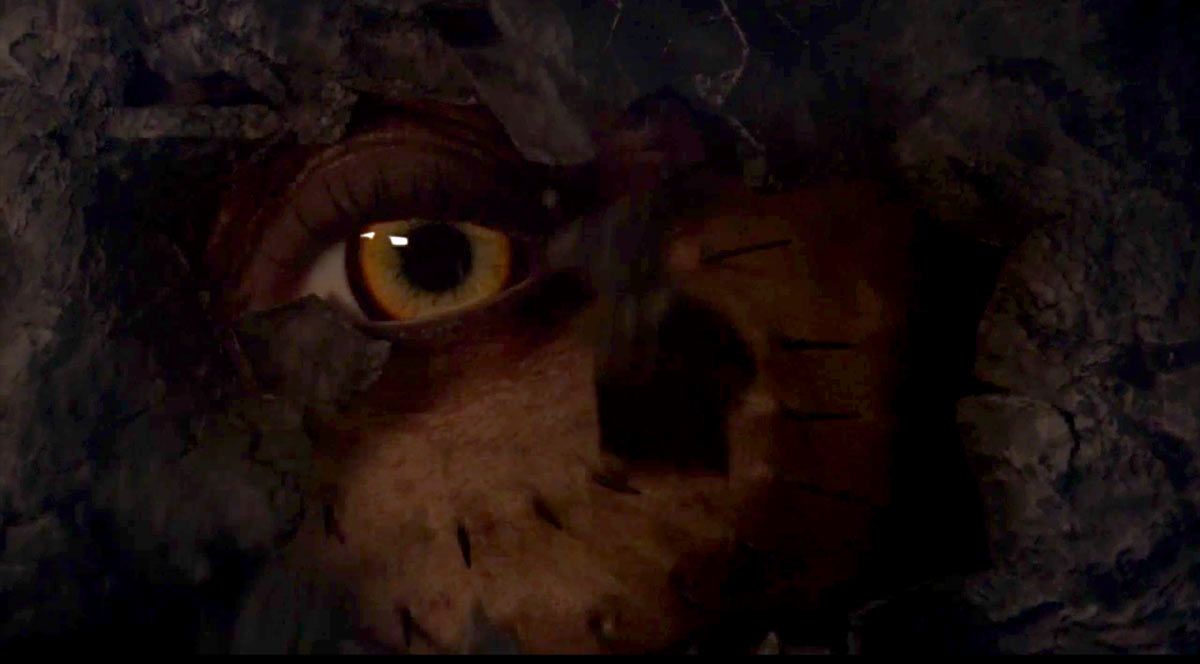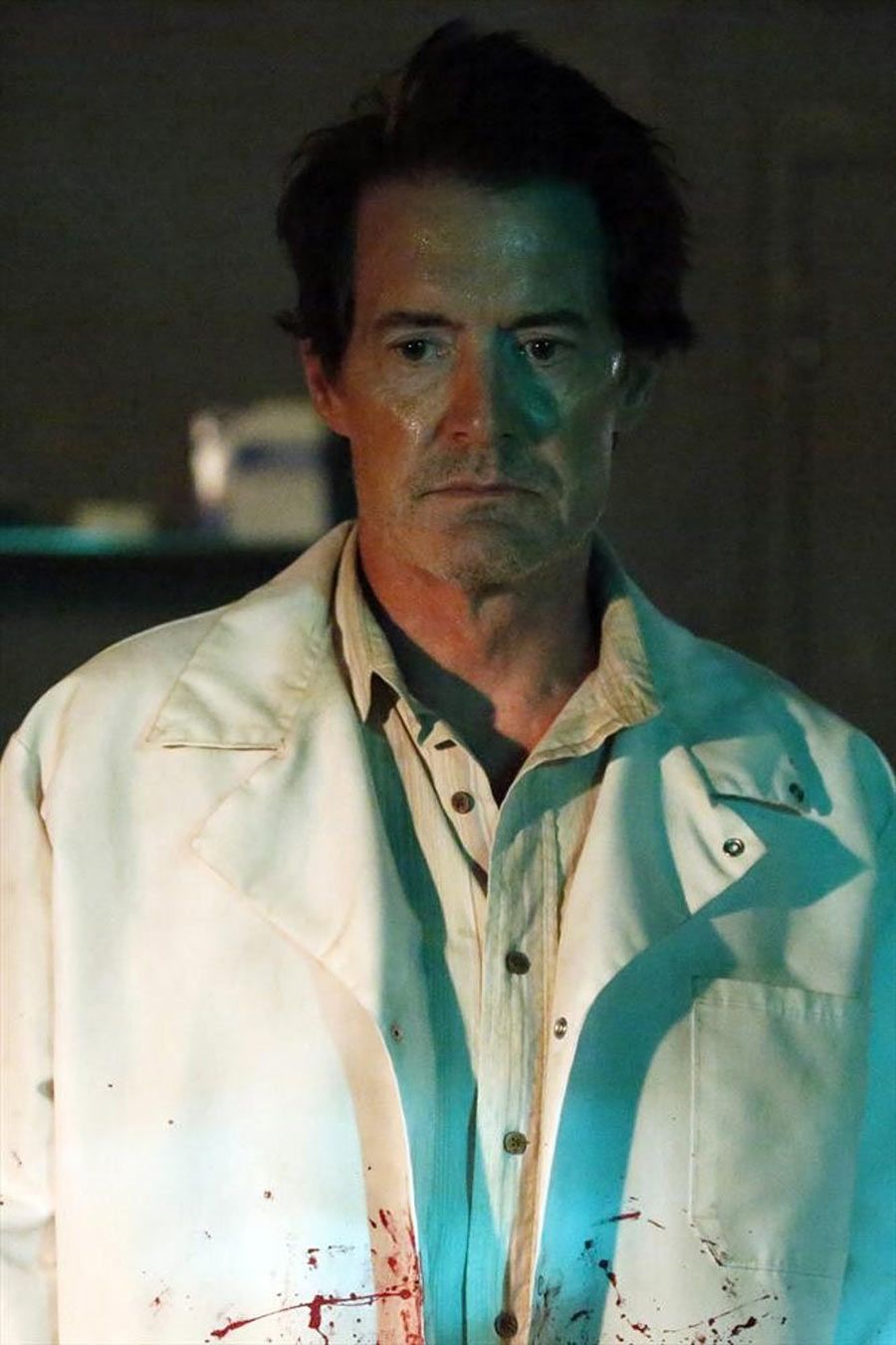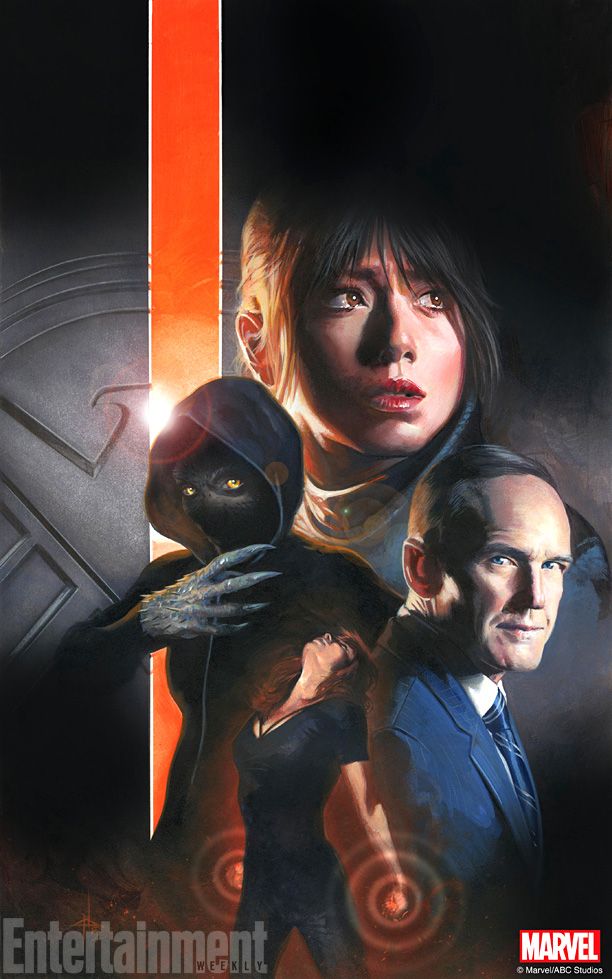They're members of the secret brain trust constantly trying to complicate the lives of the "Agents of S.H.I.E.L.D.," and they're back with another round of insidious plots -- and no, we're not talking about Hydra.
This particular cabal is made up of Marvel Studios' head of television Jeph Loeb and the series' Executive Producers Jed Whedon and Jeffrey Bell, the latter of whom penned the midseason finale episode "What They Become," which introduced the Inhumans into the Marvel Cinematic Universe by dosing S.H.I.E.L.D. agent Skye (Chloe Bennet) and the manipulative agent provocateur Raina (Ruth Negga) with Terrigen Mists, triggering their transformations into altogether new incarnations.
RELATED: Clark Gregg Talks Coulson's New Challenges as Inhumans Arrive on "Agents of SHIELD"
As "Agents of S.H.I.E.L.D." returns from its winter hiatus with a second-half arc of 12 new episodes, the three behind-the-scenes creatives gathered at one of the show's top-secret sets to provide a glimpse at what lies ahead for Director Coulson and his operatives as superpowers, trust issues and a host of new guest stars prepare to infiltrate the series.
On the starting point for the second half of Season 2:
Jeffrey Bell: We're doing 22 episodes -- and so what we're trying to do, honestly, over that is to find different colors and different flavors to play over that time, so you don't get tired of seeing the same thing. We built to this moment, and then suddenly, we've got questions about Bobbi [Morse] and [Lance] Hunter and what's that about? And suddenly, Grant [Ward] goes off with Agent 33, and what's that about? We're hoping to bring in some new questions. I think we answered a lot of questions at the end of [episodes] 9 and 10, and so, in answering questions, hopefully we ask some new ones and we'll be playing those forward from here.
Jeph Loeb: We're super-proud that in this concept of 22 episodes, we've managed to find a way that we think is both exciting and digestible so that we had 10 [episodes] in fall that came to an amazing climax for the winter finale, as they say. And then what we're super-excited about is that starting on March 3, we come back for 12-in-a-row, no interruptions, appointment television.
Jed Whedon: Because it's divided that way, it's a little bit, "A new adventure begins." We've answered so many questions, it's sort a new starting point for us.
Loeb: It's sort of "inhuman," what's happening.
Whedon: It is!
RELATED: What "Marvel's Agents of SHIELD's" Winter Finale Means for the MCU
On the repercussions of the revelation that Skye now has Inhuman abilities:
Whedon: The origin story -- regardless of how she got to that point, we are coming in in [episode] 11 with the very beginning of her realizing what really is going on. And unlike a film, we have many, many hours to play that out and to explore the different sort of emotional aspects of grappling with that huge change for someone who we've already seen is on a journey, trying to find herself and trying to find a place in the world.
Bell: Instead of montaging Spider-Man on the subway having fun for about three minutes learning his powers, we can actually explore what it means to go through that. At the beginning of the season, we tried to take Skye, who wasn't a S.H.I.E.L.D. agent at beginning of last year, and coming in this season, really grow her up as a character and as an agent, and I think Chloe did a lovely job of that through the first ten [episodes]. And then: birth of a superhero. Now, there's a whole new start and sort of entering us into whole new world of Inhumans, and what that means for her and what that means, how it effects other characters. Those are all really fun stories for us to explore. We think people get a kick out of that.
Loeb: But while we are picking up some of the threads, we do feel like there were an awful lot of cards that were put down in the fall finale, so this is a great place to jump on, if you haven't been around. If you've been watching "Agent Carter" and now you're a new viewer and you want to find out what's happening.
On whether Skye should still be thought of as Skye or, like her Marvel Comics analogue, Daisy Johnson:
Whedon: She's still Skye, because she thinks she's Skye. I think her dad thinks she's Daisy, and we'll see if she ever gets to the point where she believes that that's something that she would want to call herself. But right now, she has her own identity. Now, that will change over time, but she's definitely still Skye, and everybody still sees her that way. For now.
Loeb: It's very much what happens in the real world when an adopted child finds out their birth name. It's their choice as to whether or not they want to embrace that or whether or not they want to continue with the name that everybody knows.
Whedon: It comes down to which name is cooler, really. In the end, you're like, "That's a pretty cool name."
On Raina's Inhuman transformation, which may be cosmetically more significant than Skye's:
Bell: Raina's a character who seems to have gotten everything she every wanted through the first season-and-a-half. She successfully manipulated or moved everyone quietly, efficiently to get what she wanted. When she finally got what she wanted, it turned out to be that, which wasn't what she wanted. So we thought it was interesting to take a character who sort of had always succeeded, give them an apparent setback and see how the character reacts in those situations.
Whedon: Also, she's clearly someone who feels that she always has control over any situation, partially because of her ability to charm, and that's maybe taken a hit. [It's] harder to charm when someone's like, "Ow, you're poking me."
On the show's plans for current and upcoming guest stars:
Bell: I keep joking that guest actors are our best special effects this year. We've had Kyle [MacLachlan] and Edward James Olmos and Blair Underwood and Drea de Matteo and a whole bunch of other folks. Our cast has had such a great time with them, and they've been such a vital part of our storytelling. Usually, you need other people to tell your story, but we've been grateful to have these people. I think you'll be surprised by all of them, in some way.
Loeb: The part that has been sort of remarkable is, each of the characters are surprising and different than you may expect out of these actors. Yet, at the same time, they fit so perfectly within the way our show works. You don't all of a sudden feel, "Oh, there's a special guest star, and we should do that." I think certainly Bill [Paxton] gave that to us as Garrett last season. He just sort of walked on and we were like, "Oh -- there's Garrett." That's the kind of feeling we are going for. We're just making a gigantic cast more gigantic.
Bell: Mr. Olmos needs to remain a mystery for now. Drea is someone on the index. Delightful, and she gets to spend a lot of time with Cal and they have sort of a shared love of S.H.I.E.L.D.
Loeb: I think we did imply she's a dark character.
Whedon: As with any person, she has a reason [for her actions]. She's misunderstood. I don't think she's a dark character; I think she has a heart of gold.
Bell: As with Cal, there's an episode where he finds similar people on the index who aren't happy with S.H.I.E.L.D. What I love is how endearing they are all treated. They are all misfits, and they're really fun together.
Whedon: That's something we found with Cal. That's something we were aiming for, but he really brings it to life in way that exceeded our expectations.
Bell: I think we should start a Kyle MacLachlan guest star Emmy campaign, because I think he's awesome. I think he's brought so much to this role. He's an antagonist, he's not a villain. He wants to put his family back [together].
Whedon: He breaks your heart. His performance is constantly riding that edge of, "I don't know what he's going to do," to, "Oh, I should probably take him in and feed him."
Loeb: And everybody around you is dead, and you go, "Oh, maybe that wasn't a good idea." He takes us into a world that we haven't gotten to go into very much in the past. We try to find ways to bring humor and scary and thrilling and loving and emotional into it, and his character has taken us into the world. And Drea has been a big part of that.
On the bigger-picture of Inhumans, superpowers and their repercussions, both in the Marvel Cinematic Universe and within the core cast of S.H.I.E.L.D. characters:
Whedon: The realities of the world they're living in now are starting to become much more complicated. We saw at the beginning of the season that Coulson was already dealing with grays he hadn't had to deal with before. He was always a "don't leave a man behind" kind of guy. He's already having to deal with something else, and now we're opening up another aspect to that, a whole other set of grays. What is this power? What is too much power? What is it like for your friend to have it? And have we opened Pandora's Box by pursuing all of this? Truthfully, there wouldn't be aliens to invade in "Avengers" if they hadn't been experimenting with the Cube. There's a lot of questions of, what's the cause, and what's the effect?
Loeb: One of the things that really makes the Marvel Universe different from other genre stories -- and it's one of the things that people are still learning about -- is when they think about comic books, the idea is many people assume we live in a world where super-powered people fly out everywhere or are bursting out at the seams. And that is very much what made the Marvel Universe the Marvel Universe in publishing, was that suddenly, a fight could break out on the street at any moment.
When you look at the Marvel Cinematic Universe, it's a much more contained idea. And people with powers are very special in that way, in that if you look at Tony Stark, he's a man who built a suit, and he has no particular gift or enhancement himself. When you look at Thor -- at least in the Marvel Cinematic Universe -- we consider him more of an alien than we do somebody who has a magic hammer. So, now, you get down to, really, who has powers and abilities? Steve Rogers is someone who went through a program in the military, changed himself through a serum and has now got Captain America's abilities. You pervert that a little bit and add some Gamma Rays, and you wind up with the Hulk. That's it, folks.
When you start looking at Hawkeye and Black Widow, they very much live in the world of our S.H.I.E.L.D. agents. They're extremely capable, but they don't have any enhancements, per se. And so, now, in a world where it's now starting to grow a little bit more, you have to decide whether or not that makes you comfortable, or whether or not that makes you uncomfortable. Are these people heroic, or are these people not heroic? Are these people a danger to us, or are these people something that we should be elevating, worshipping? And, like any hero in the real world, there's a very real person inside of there. So every single time we decide that our role model is that football player, that musician, that politician and then, oops -- a story breaks out, and we find out that they're a human being, or they've made a mistake, or worse, now, suddenly, we have to go find different heroes. That metaphor works really well for what our show does.
Whedon: I would add that it's also an internal struggle. The Hulk is an example of someone who doesn't really want this and struggles with it. It's not just a philosophical discussion of, are these people good for us, are they bad for us, what is too much power? These people are dealing with it internally, and that's some of the stuff we're going to explore in this season.
Bell: Right -- and we have Raina, who wanted this her whole life and got something, and Skye, who didn't want it and got something, and so how does each character react to that is, we think, interesting.

